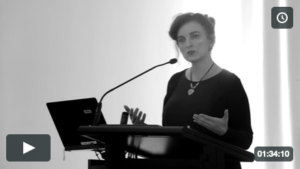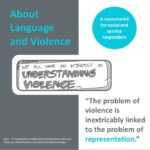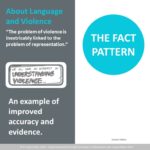The Language Lab
"The problem of violence is inextricably linked to the problem of representation." (Dr Linda Coates & Dr Allan Wade)
The Language Lab provides information on the role of language in representing violence and abuse, and tools to help us use language to more accurately represent violence and other adversities. It recognises that language can be used in restrictive or liberating ways to:
- conceal or reveal violence
- obscure or reveal offender responsibility
- conceal or reveal responses and resistance; and
- blame or contest the blaming of, victims (1).
1. Dr Linda Coates and Dr Allan Wade (2007), 'Language and Violence: Analysis of Four Discursive Operations', Journal of Family Violence, 22:511-522.
Masterclass on Language and Violence
Video of the Masterclass on Language and Violence with Dr Linda Coates (90mins)
Language Lab Resources and Tools
Language and Violence Resource Kit (2nd edition)
This document was shared at the 'Masterclass on Language and Violence' (2018)
The Fact Pattern (2nd edition)
An example of improved accuracy and evidence.
Example of the ideas applied
An analysis of an account of a woman's experience of domestic violence by Practice Exchange participants from the Penrith Women's Health Centre.
Language
Throughout our resources we use the word:
- ‘Victim’ to refer to a person who is being or has been deliberately harmed, not as an identity term. Some people prefer to use other terms, including the term ‘survivor’ however we are cautious about assuming to use this word because not everyone can speak in past tense as having survived violence and their experiences are current and have no clear ending. For clarity and consistency we keep to the term victim for reasons explained.
- ‘Perpetrator’ to refer to a person who is deliberately harming or has harmed others, not as an identity term.
- ‘Violence’ is used to encompass a range of oppressive, abusive, controlling, undermining and overpowering behaviours.
- ‘Sexualised violence’ is used instead of ‘sexual violence’ or ‘sexual assault/abuse’ (unless using a quote) because the behaviours these terms refer to are a form of ‘violence and abuse’ not a form of ‘sex’. Our intention is to draw attention to the violence and abuse without the use of the mutualising term ‘sexual or sex’.
- ‘Resistance to violence’ is used to describe and acknowledge the myriad ways victims of violence try to create safety and uphold their dignity while being oppressed, assaulted, or abused.



